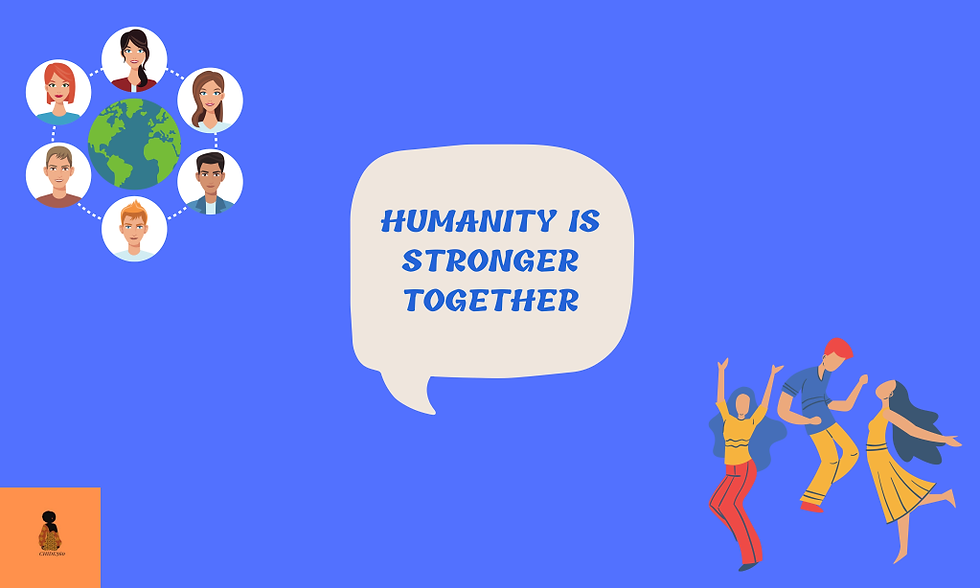Is The Rational Man a Nigerian?
- Margaret Aligbe

- Feb 29, 2024
- 6 min read
In Economics, the rational man is central to maximizing benefits and it is argued that we are all after our self-interest. Adam Smith in his famous quote said “It is not from the benevolence of the butcher, the brewer, or the baker that we expect our dinner but from their regard to their self-interest “.

Agreed, self-interest is something very important to our lives but it is not the only reason we do things. Everyone will tell you at least once they did something they wanted to do not because they expected anything back. Even the worst of us humans have some elements of goodness in us, it just depends on who is seeing that side of us. But here we are in a capitalist society where we continue to hear words that reinforce selfishness being a good thing and how it can be harnessed as a force for good. In seeking our self-interest every time, we somehow make society better. I do not think capitalism is a bad thing and I don’t see the world existing without capitalism, It ends when the world ends (an argument for another day). The Nigerian society would be the perfect example of rationality except that opportunities are limited, and there is hardly any trickle-down for such human rationality as described in economics to be maximized.
As Nigerians, we easily call our leaders out for being selfish, and corrupt but the more you look the more you realize leadership/politicians are a reflection of their society. The same thing those politicians do up there is practiced in everyday choices and decisions at different levels of society including positions of influence and power, no matter how small. There is something inherent about oppressing someone you are “bigger” than, a deep desire to prove yourself and be loud even when it is not necessary. This is not a generic behavior only Nigerians manifest though. But it is something prevalent in society creating an extreme culture of “faux” elitist demeanor and a lack of empathy in dealing with others…..never leaving our bubble. So, maybe we deserve our leaders as I wrote in a previous post.
As I read through Doughnut Economics by Kate Raworth and 23 Things They Don’t Tell You About Capitalism by Ha-Joon Chang, it became clear how preconceived mindset about Nigerians being “bad” by Nigerians reflects in policies, governance and how we deal with each other. The approach to governance is laced with punitive undertones, as though Nigerians lack the initiative to do the right thing on their own. Someone has to police you to act right but you wonder how the same Nigerians behave differently abroad. Yes, the system makes us inherently selfish and untrusting towards others but the homo economicus AKA rational man argument would then make the society better since everyone is out to put their interest first. In Nigeria, this is further from the truth. Saying core elements of traditional economics fail woefully or the logic diminishes in the face of the complexity of Nigerian society would be describing our predicament mildly. It is like being in a quagmire, a sort of complexity that looks easy to manage but becomes like a rabbit hole …the more you look, the less you see.

Living in Sweden and how much solid social contract thrives here, i begin to wonder why we don’t trust each other. Why do we often think Nigerians are difficult people…..it is like saying human beings are stubborn like goats, so you would always want to approach any form of a solution with harshness. There is little or no room for any benefit of the doubt, you automatically assume someone is going to cheat you, so you continually want to count the money again, look at all the signs of the bank alert being real, and put checks and balances (they don’t even work sometimes). You double-check things even when you should not even be doing so.
The bad ones are often the loudest, almost like everyone in Nigeria is a bad person or a suspect. The downside of a weak governance structure in a complex society like Nigeria rooted in diverse cultures and religions means the whole society suffers. Lack of trust and everyone out to maximize opportunities for selfish interest means we start seeing a society where people do things because there is something to gain. You suddenly start feeling awkward when someone smiles at you or plays with your child because you are tempted to think they want to scam you.
You cannot trust anyone; the plumber, the tailor, the teacher, the banker, The vendor, that colleague, that lecturer, the mechanic, the neighbor, the landlord, your sales girl, the lawyer, everyone is government……everyone is a suspect and the “not so surprising thing” is that 9 out of 10 times, your instincts to be weary of others will save you. And yes, someone is out to cheat to you (even if they are swearing in the name of God) or maybe kill you and these days, kidnap you. Regardless of our lived experiences, there are worse places than living in Nigeria, I assure you.
It is a terrible state of existence. It would be unfair to compare Nigerian society to Swedish society as I said in another blog post. To understand the complexity of Nigeria, you would join the whole of Scandinavia (and parts of the EU) into a single country, with different religions, cultures, languages, and dialects.
Governance is complicated and it becomes easy to understand why people don’t trust each other and even worse, government compared to Scandinavian countries where citizens believe so much in governance and social contract works well and the system itself in such a “homogeneous” society is easier to manage. Living in such a society, you would believe in the “goodness” of the human race, you don’t constantly look out for someone trying to cheat you. Your argument against the rational man theory would be that humans are not inherently selfish and you could use your lived experience to drive your point home but for a Nigerian with limited opportunities, your lived experience says, human selfishness is central to all your everyday hustle does not work in a society of limited opportunities. That being said, Nigeria is a country of so millions of people like oil and water trying to mix.
I look at the rational man and I see he is a Nigerian but the difference is that he lacks the opportunity to thrive. Whatever rationality or selfishness or self-interest he presently maximizes is him trying to survive on the edge of the periphery of an unequal world. He is constantly on his own and looks out for himself and those close to him.
Perhaps, the rational man is not a Nigerian. Rationality may not be a Nigerian thing. Maybe the rational man ended in my economics textbook because if maximizing self-interest is something positive to develop the economy, then Nigeria has proven that to be a lie. Nigerians are not bad people and we have our stories of triumph even though we have to try 10 times as hard many times. There are countless stories of how Nigerians have helped each other and this is not me trying too hard. On social media, funds have been raised so many times to support hospital bills, school fees, living expenses and the like. People have gotten jobs from referrals from strangers and received help from others.
The reality of selfishness and fleecing each other is the everyday headline, stories of politicians who no longer pretend about disappointing constituents and all sorts of evils but Nigerians are not as bad as you hear. Our reputation precedes us, all the stories of fraud and the famous “Nigerian Prince” are all too common but then again, we are overachievers and some of the well-educated humans on the planet. Maybe, the Nigerian rationality that drives self-interest can be a good thing after all, when you are out hustling trying to take care of your own.
So yes, rational man should not be such a powerful ideology in economics because selfishness is inherently human regardless of their nationality. The argument of capitalism in the core countries, the rich superpowers of the world and how GDP does not reflect the true reality of citizens is exactly the lived experience of Nigerians. With limited opportunities and zero trickle-down prosperity, there is no rationality or good “selfishness” to plan your life with. Instead, more poverty and inequality are what is left to be maximized. When millions scramble to survive in a complex society like Nigeria which is supposed to thrive on diversity, conflict is inevitable. The lack of trust and a mindset that people are selfish and out to ruin you or kill you puts everyone in defense mode.
But there is no rational man anywhere, we are all humans trying to get by each day and we do plenty of good many times not because we have something to benefit from. Maybe when the economy gets better we will stop expecting the worst of each other, we will stop suspecting each other and trust ourselves, and leadership more regardless of our religion and tribe. Our selfishness as it were is everyone trying to survive and nothing more. Hunger does not respect morals. Till we start to live trickle-down economics in all its fullness with opportunities for more people to maximize, homo economicus remains a figment of my imagination as a Nigerian, stuck in my economics textbook.







Comments